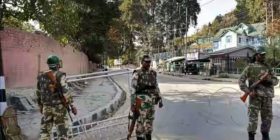1) From midnight, the Rs 500 and Rs 1000 will cease to be legal tender.
2) The 500 and 1000 Rs notes can be submitted to the post offices and banks from 10th November to 30th December.
3) Those who can’t sumbit the notes within the deadline, can exchange it at Reserve Bank of India by providing a declaration.
4) On November 9 and in some places November 10, ATMs will not work.
5) For 72 hrs, until Nov 11 midnight special arrangements made. All government hospitals will accept old 500 & 1000 notes.
6) RBI’s proposal for new Rs 2000 note has been accepted.
7) On November 9, all banks will remain closed for public work.
Why RBI is issuing ₹2000 Rupees Notes ?
The Rs 2000 currency is designed keeping in mind to eradicate the black money issues using state of the art indigenous nano technology, every Rs. 2000 currency note is embedded with a *NGC (Nano GPS Chip)*
1) How the embeded NGC Technology Works?
The unique feature of the NGC is it dosent need any power source. It only acts as a signal reflector. When a Satellite sends a signal requesting location the NGC reflects back the signal from the location, giving precise location coordinates, and the serial number of the currency back to the satellite, this way every NGC embedded currency can be easily tracked & located even if it is kept 120 meters below ground level. The NGC cant be tampered with or removed without damaging the currency note
2) How will this help eradicate black money menace?
Since every NGC embeded currency can be tracked. The satellite can identify the exact amount of money stored at a certain location. If a relatively high concentration of currency is found a certain location for a longer period of time at suspicious locations other than banks & other financial institutions. The information will be passed on to the Income Tax Department for further investigation.
Guidelines Issued by RBI:
The Government and keeping in view the need to minimise inconvenience to the public, the following operational guidelines have been issued:-
(i) Old High Denomination Bank Notes may be deposited by individuals/persons into their bank accounts and/or exchanged in bank branches or Issue Offices of RBI till the close of business hours on 30thDecember, 2016.
(ii) Old High Denomination Bank Notes of aggregate value of Rs.4,000/- only or below held by a person can be exchanged by him/her at any bank branch or Issue Office of Reserve Bank of India for any denomination of bank notes having legal tender character, provided a Requisition Slip as per format to be specified by RBI is presented with proof of identity and along with the Old High Denomination Bank Notes. Similar facilities will also be made available in Post Offices.
(iii) The limit of Rs.4,000/- for exchanging Old High Denomination Bank Notes at bank branches or at issue offices of Reserve Bank of India will be reviewed after 15 days and appropriate notification issued, as may be necessary.
(iv) There will not be any limit on the quantity or value of Old High Denomination Bank Notes to be credited to the account of the tenderer maintained with the bank, where the Old High Denomination Bank Notes are tendered. However, in accounts where compliance with extant Know Your Customer (KYC) norms is not complete, a maximum value of Rs.50,000/- of Old High Denomination Bank Notes can be deposited.
(v) The equivalent value of the Old High Denomination Bank Notes tendered can be credited to an account maintained by the tenderer at any bank in accordance with standard banking procedure and on production of valid proof of Identity.
(vi) The equivalent value of the Old High Denomination Bank Notes tendered can be credited to a third party account, provided specific authorisation therefor accorded by the said account holder is presented to the bank, following standard banking procedure and on production of valid proof of Identity of the person actually tendering.
(vii) Cash withdrawal from a bank account, over the counter will be restricted to Rs.10,000/- subject to an overall limit of Rs. 20,000/- in a week for the first fortnight, i.e., until the end of business hours on November 24, 2016.
(viii) There will be no restriction on the use of any non-cash method of operating the account which will include cheques, demand drafts, credit/debit cards, mobile wallets and electronic fund transfer mechanisms.
(ix) Withdrawal from ATMs would be restricted to Rs.2,000 per day per card up to November 18, 2016. The limit will be raised to Rs.4,000 per day per card from November 19, 2016 onwards.
(x) For those who are unable to exchange their Old High Denomination Bank Notes or deposit the same in their bank accounts on or before December 30, 2016, an opportunity will be given to them to do so at specified offices of the RBI on later dates along with necessary documentation as may be specified by the Reserve Bank of India.
(xi) Instruction is also being issued for closure of banks and Government Treasuries, on 9th November, 2016.
(xii) In addition, all ATMs, Cash Deposit Machines, Cash Recyclers and any other machine used for receipt and payment of cash will remain shut on 9th and 10thNovember, 2016.
(xiii) The bank branches and Government Treasuries will function from 10th November, 2016.
(xiv) To avoid inconvenienceto the public for the first 72 Hours, Old High Denomination Bank Notes will continue to be accepted at Government Hospitals and pharmacies in these hospitals/Railway ticketing counters/ticket counters of Government/Public Sector Undertaking buses and airline ticketing counters at airports; for purchases at consumer co-operative societies, at milk booths, at crematoria/burial grounds, at petrol/diesel/gas stations of Public Sector Oil Marketing Companies and for arriving and departing passengers at international airports and for foreign tourists to exchange foreign currency at airports up to a specified amount.
The relevant Notifications are available in the website of Finance Ministry (http://finmin.nic.in/). Further details including Frequently Asked Questions (FAQs) are available on the website of the Reserve Bank of India (https://www.rbi.org.in/).





Leave a reply